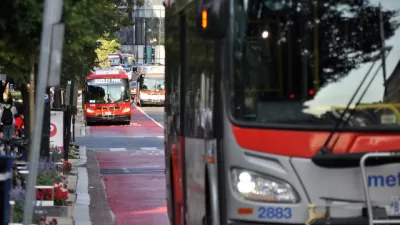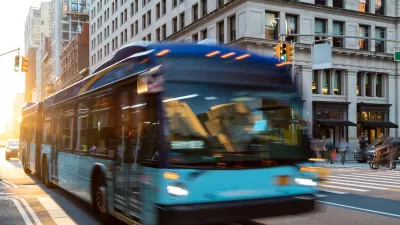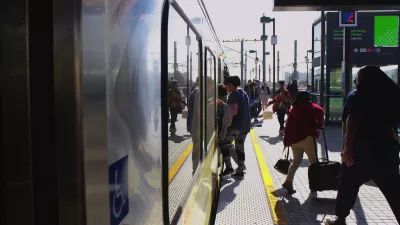Transit agencies around the country are boosting their efforts to serve historically marginalized communities and make transit work better for the households that rely on it the most.

A new report from the American Public Transportation Association (APTA) highlights the efforts transit agencies around the country are making to increase equity and provide effective transit service to the low-income households that often depend on it the most.
According to an article by Dan Zukowski in Smart Cities Dive, “The report summarizes equity-related actions from 75 organizations and takes an in-depth look at efforts by 11 transit agencies.”
Some agencies, like the Chicago Transit Authority (CTA) and the Central Puget Sound Regional Transit Authority, have created positions specifically dedicated to addressing equity. “The Massachusetts Bay Transit Authority requires an equity analysis for all proposed fare changes and major service changes,” while the Los Angeles County Metropolitan Transportation Authority (Metro) created an equity dashboard to increase transparency and appraise the public of its efforts.
In some cases, transit agencies are expanding their scope to support transit-oriented development with affordable housing and multimodal infrastructure near their stations. “Other agencies are getting directly involved with the communities they serve to address homelessness. The Metropolitan Atlanta Rapid Transit Authority is partnering with a homeless shelter to provide individual-level resources. The Lane Transit District in Eugene, Oregon, partnered with the city to find vacant land the transit agency owned that could be used as safe sleep areas for people experiencing homelessness,” Zukowski adds.
The APTA report offers three recommendations for transit agencies seeking to improve equity: develop an equity mission statement to guide goals and priorities; ensure the necessary internal resources to consider equity during all processes; and build community through initiatives that provide tangible benefits to the agency’s constituent communities.
FULL STORY: Transit agencies document equity efforts in APTA report

Maui's Vacation Rental Debate Turns Ugly
Verbal attacks, misinformation campaigns and fistfights plague a high-stakes debate to convert thousands of vacation rentals into long-term housing.

Planetizen Federal Action Tracker
A weekly monitor of how Trump’s orders and actions are impacting planners and planning in America.

San Francisco Suspends Traffic Calming Amidst Record Deaths
Citing “a challenging fiscal landscape,” the city will cease the program on the heels of 42 traffic deaths, including 24 pedestrians.

Defunct Pittsburgh Power Plant to Become Residential Tower
A decommissioned steam heat plant will be redeveloped into almost 100 affordable housing units.

Trump Prompts Restructuring of Transportation Research Board in “Unprecedented Overreach”
The TRB has eliminated more than half of its committees including those focused on climate, equity, and cities.

Amtrak Rolls Out New Orleans to Alabama “Mardi Gras” Train
The new service will operate morning and evening departures between Mobile and New Orleans.
Urban Design for Planners 1: Software Tools
This six-course series explores essential urban design concepts using open source software and equips planners with the tools they need to participate fully in the urban design process.
Planning for Universal Design
Learn the tools for implementing Universal Design in planning regulations.
Heyer Gruel & Associates PA
JM Goldson LLC
Custer County Colorado
City of Camden Redevelopment Agency
City of Astoria
Transportation Research & Education Center (TREC) at Portland State University
Jefferson Parish Government
Camden Redevelopment Agency
City of Claremont





























